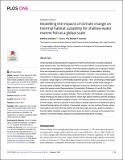Modelling the impacts of climate change on thermal habitat suitability for shallow-water marine fish at a global scale
Abstract
Understanding and predicting the response of marine communities to climate change at large spatial scales, and distilling this information for policymakers, are prerequisites for ecosystem-based management. Changes in thermal habitat suitability across species’ distributions are especially concerning because of their implications for abundance, affecting species’ conservation, trophic interactions and fisheries. However, most predictive studies of the effects of climate change have tended to be sub-global in scale and focused on shifts in species’ range edges or commercially exploited species. Here, we develop a widely applicable methodology based on climate response curves to predict global-scale changes in thermal habitat suitability. We apply the approach across the distributions of 2,293 shallow-water fish species under Representative Concentration Pathways 4.5 and 8.5 by 2050–2100. We find a clear pattern of predicted declines in thermal habitat suitability in the tropics versus general increases at higher latitudes. The Indo-Pacific, the Caribbean and western Africa emerge as the areas of most concern, where high species richness and the strongest declines in thermal habitat suitability coincide. This reflects a pattern of consistently narrow thermal ranges, with most species in these regions already exposed to temperatures above inferred thermal optima. In contrast, in temperate regions, such as northern Europe, where most species live below thermal optima and thermal ranges are wider, positive changes in thermal habitat suitability suggest that these areas are likely to emerge as the greatest beneficiaries of climate change, despite strong predicted temperature increases.
Citation
Lavender , E , Fox , C & Burrows , M 2021 , ' Modelling the impacts of climate change on thermal habitat suitability for shallow-water marine fish at a global scale ' , PLoS ONE , vol. 16 , no. 10 , e0258184 . https://doi.org/10.1371/journal.pone.0258184
Publication
PLoS ONE
Status
Peer reviewed
ISSN
1932-6203Type
Journal article
Description
Funding: EL received no specific funding for this work. C.J.F. received no specific funding for this work. M.T.B was supported by Natural Environment Research Council grant NE/J024082/1 (https://nerc.ukri.org).Collections
Items in the St Andrews Research Repository are protected by copyright, with all rights reserved, unless otherwise indicated.

